Hotel and Hospitality Management Practices: A Comprehensive Analysis
VerifiedAdded on 2022/12/29
|7
|1620
|100
Report
AI Summary
This report provides a comprehensive analysis of the hospitality industry, drawing on various scholarly articles to explore key concepts and practices. The report begins by examining the foundational understanding of hospitality through social science perspectives, referencing works by Lashley and Derrida to establish the cultural and social dimensions of the industry. It then delves into the practical aspects of hospitality management, analyzing employee empowerment in the United States hotel sector, the perceptions of hospitality workers, and the attractiveness of Australian events to Chinese visitors. The report highlights the importance of employee empowerment, the challenges and opportunities in attracting international tourists, and the evolving nature of hospitality in a commercial context. The analysis includes a review of research methodologies, findings, and limitations from the selected articles, offering insights into the dynamics of the hospitality industry. It emphasizes the significance of understanding both the host-guest relationship and the impact of cultural factors on hospitality practices, with a focus on commercial settings.
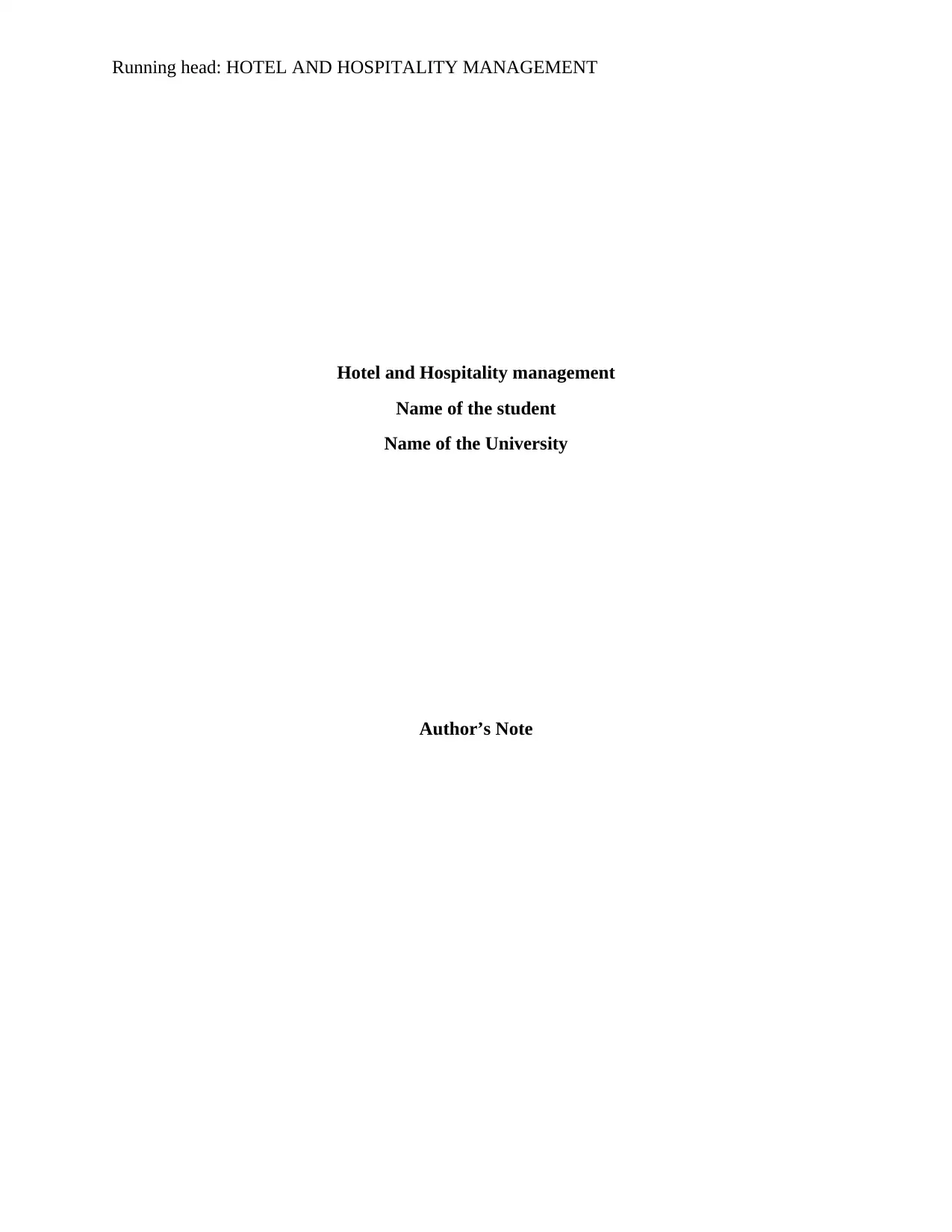
Running head: HOTEL AND HOSPITALITY MANAGEMENT
Hotel and Hospitality management
Name of the student
Name of the University
Author’s Note
Hotel and Hospitality management
Name of the student
Name of the University
Author’s Note
Paraphrase This Document
Need a fresh take? Get an instant paraphrase of this document with our AI Paraphraser
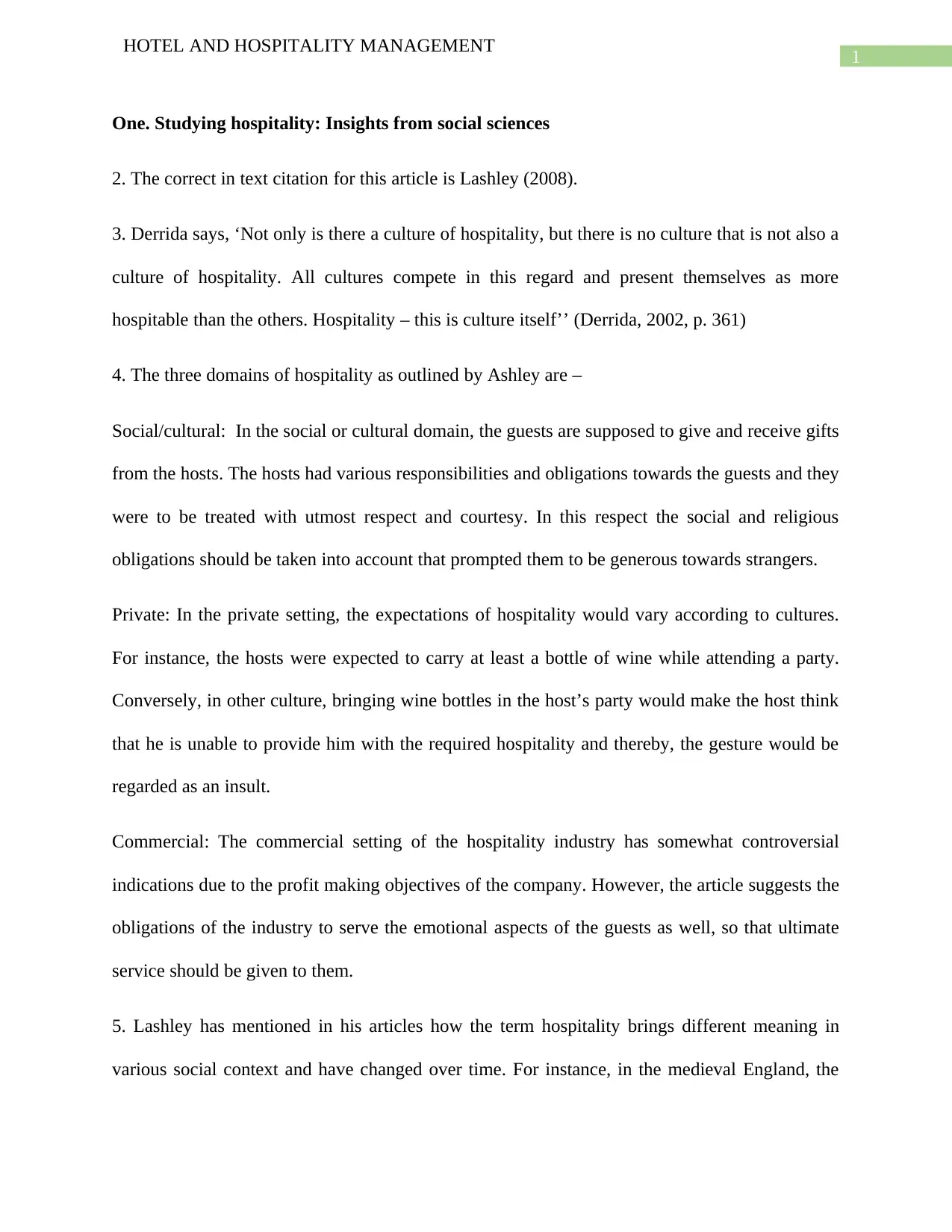
1
HOTEL AND HOSPITALITY MANAGEMENT
One. Studying hospitality: Insights from social sciences
2. The correct in text citation for this article is Lashley (2008).
3. Derrida says, ‘Not only is there a culture of hospitality, but there is no culture that is not also a
culture of hospitality. All cultures compete in this regard and present themselves as more
hospitable than the others. Hospitality – this is culture itself’’ (Derrida, 2002, p. 361)
4. The three domains of hospitality as outlined by Ashley are –
Social/cultural: In the social or cultural domain, the guests are supposed to give and receive gifts
from the hosts. The hosts had various responsibilities and obligations towards the guests and they
were to be treated with utmost respect and courtesy. In this respect the social and religious
obligations should be taken into account that prompted them to be generous towards strangers.
Private: In the private setting, the expectations of hospitality would vary according to cultures.
For instance, the hosts were expected to carry at least a bottle of wine while attending a party.
Conversely, in other culture, bringing wine bottles in the host’s party would make the host think
that he is unable to provide him with the required hospitality and thereby, the gesture would be
regarded as an insult.
Commercial: The commercial setting of the hospitality industry has somewhat controversial
indications due to the profit making objectives of the company. However, the article suggests the
obligations of the industry to serve the emotional aspects of the guests as well, so that ultimate
service should be given to them.
5. Lashley has mentioned in his articles how the term hospitality brings different meaning in
various social context and have changed over time. For instance, in the medieval England, the
HOTEL AND HOSPITALITY MANAGEMENT
One. Studying hospitality: Insights from social sciences
2. The correct in text citation for this article is Lashley (2008).
3. Derrida says, ‘Not only is there a culture of hospitality, but there is no culture that is not also a
culture of hospitality. All cultures compete in this regard and present themselves as more
hospitable than the others. Hospitality – this is culture itself’’ (Derrida, 2002, p. 361)
4. The three domains of hospitality as outlined by Ashley are –
Social/cultural: In the social or cultural domain, the guests are supposed to give and receive gifts
from the hosts. The hosts had various responsibilities and obligations towards the guests and they
were to be treated with utmost respect and courtesy. In this respect the social and religious
obligations should be taken into account that prompted them to be generous towards strangers.
Private: In the private setting, the expectations of hospitality would vary according to cultures.
For instance, the hosts were expected to carry at least a bottle of wine while attending a party.
Conversely, in other culture, bringing wine bottles in the host’s party would make the host think
that he is unable to provide him with the required hospitality and thereby, the gesture would be
regarded as an insult.
Commercial: The commercial setting of the hospitality industry has somewhat controversial
indications due to the profit making objectives of the company. However, the article suggests the
obligations of the industry to serve the emotional aspects of the guests as well, so that ultimate
service should be given to them.
5. Lashley has mentioned in his articles how the term hospitality brings different meaning in
various social context and have changed over time. For instance, in the medieval England, the
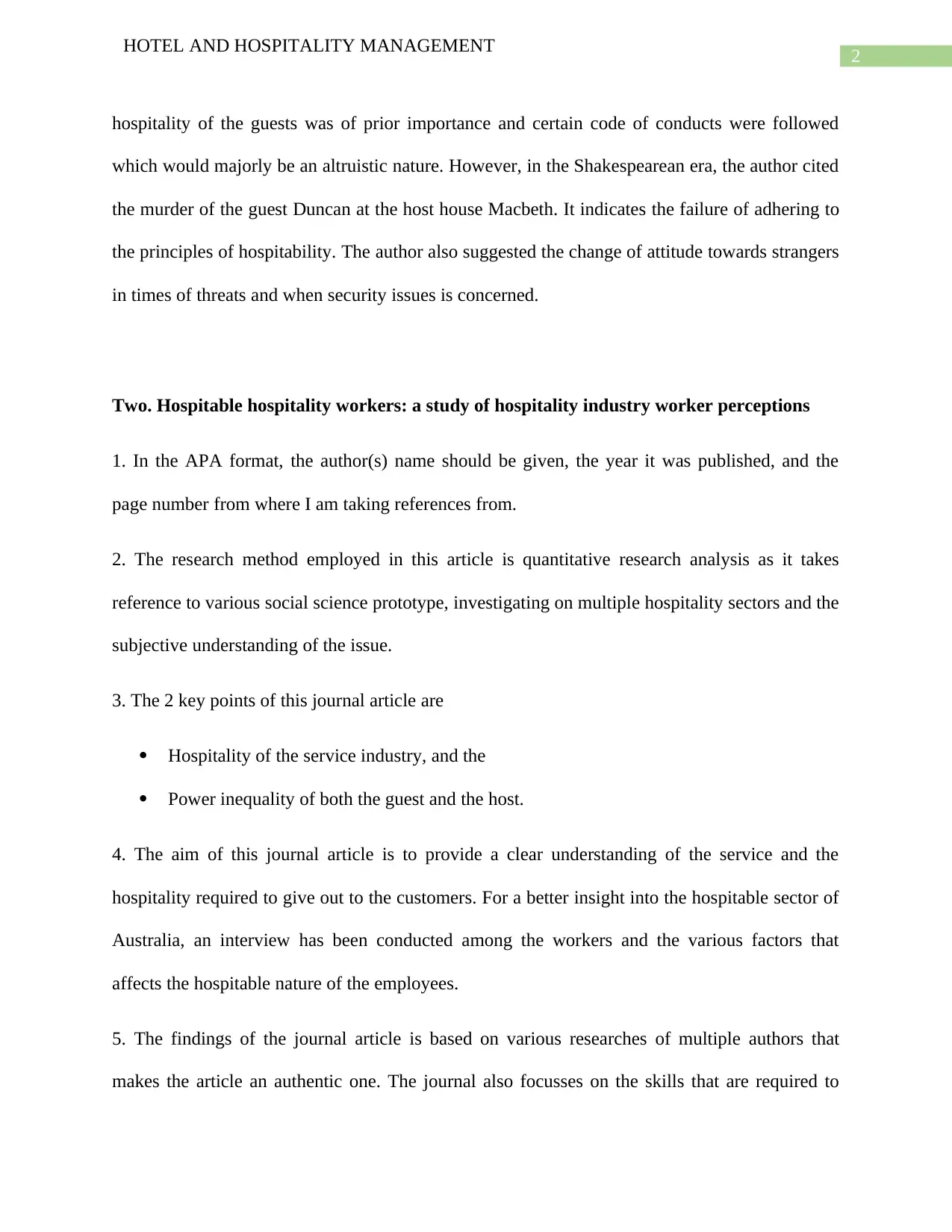
2
HOTEL AND HOSPITALITY MANAGEMENT
hospitality of the guests was of prior importance and certain code of conducts were followed
which would majorly be an altruistic nature. However, in the Shakespearean era, the author cited
the murder of the guest Duncan at the host house Macbeth. It indicates the failure of adhering to
the principles of hospitability. The author also suggested the change of attitude towards strangers
in times of threats and when security issues is concerned.
Two. Hospitable hospitality workers: a study of hospitality industry worker perceptions
1. In the APA format, the author(s) name should be given, the year it was published, and the
page number from where I am taking references from.
2. The research method employed in this article is quantitative research analysis as it takes
reference to various social science prototype, investigating on multiple hospitality sectors and the
subjective understanding of the issue.
3. The 2 key points of this journal article are
Hospitality of the service industry, and the
Power inequality of both the guest and the host.
4. The aim of this journal article is to provide a clear understanding of the service and the
hospitality required to give out to the customers. For a better insight into the hospitable sector of
Australia, an interview has been conducted among the workers and the various factors that
affects the hospitable nature of the employees.
5. The findings of the journal article is based on various researches of multiple authors that
makes the article an authentic one. The journal also focusses on the skills that are required to
HOTEL AND HOSPITALITY MANAGEMENT
hospitality of the guests was of prior importance and certain code of conducts were followed
which would majorly be an altruistic nature. However, in the Shakespearean era, the author cited
the murder of the guest Duncan at the host house Macbeth. It indicates the failure of adhering to
the principles of hospitability. The author also suggested the change of attitude towards strangers
in times of threats and when security issues is concerned.
Two. Hospitable hospitality workers: a study of hospitality industry worker perceptions
1. In the APA format, the author(s) name should be given, the year it was published, and the
page number from where I am taking references from.
2. The research method employed in this article is quantitative research analysis as it takes
reference to various social science prototype, investigating on multiple hospitality sectors and the
subjective understanding of the issue.
3. The 2 key points of this journal article are
Hospitality of the service industry, and the
Power inequality of both the guest and the host.
4. The aim of this journal article is to provide a clear understanding of the service and the
hospitality required to give out to the customers. For a better insight into the hospitable sector of
Australia, an interview has been conducted among the workers and the various factors that
affects the hospitable nature of the employees.
5. The findings of the journal article is based on various researches of multiple authors that
makes the article an authentic one. The journal also focusses on the skills that are required to
⊘ This is a preview!⊘
Do you want full access?
Subscribe today to unlock all pages.

Trusted by 1+ million students worldwide
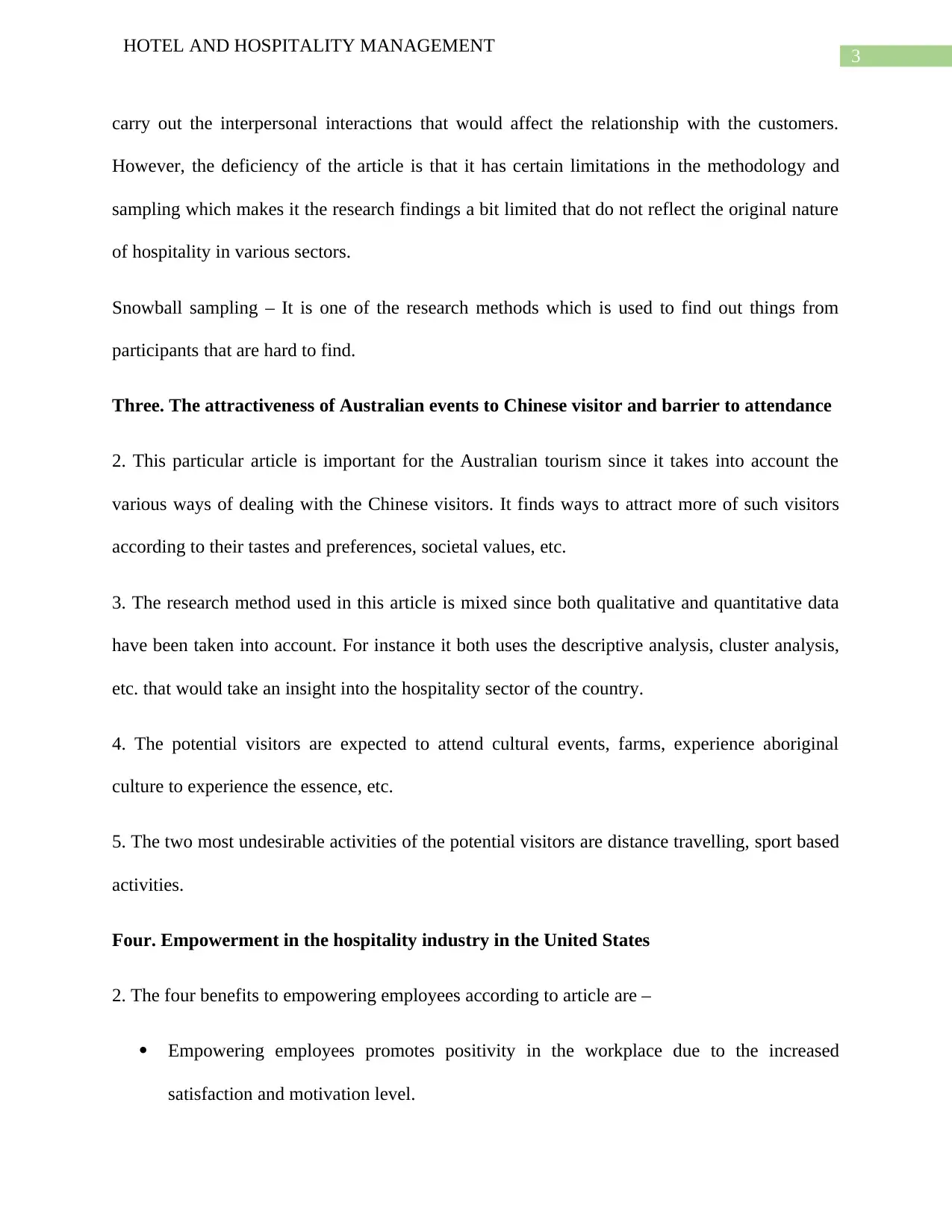
3
HOTEL AND HOSPITALITY MANAGEMENT
carry out the interpersonal interactions that would affect the relationship with the customers.
However, the deficiency of the article is that it has certain limitations in the methodology and
sampling which makes it the research findings a bit limited that do not reflect the original nature
of hospitality in various sectors.
Snowball sampling – It is one of the research methods which is used to find out things from
participants that are hard to find.
Three. The attractiveness of Australian events to Chinese visitor and barrier to attendance
2. This particular article is important for the Australian tourism since it takes into account the
various ways of dealing with the Chinese visitors. It finds ways to attract more of such visitors
according to their tastes and preferences, societal values, etc.
3. The research method used in this article is mixed since both qualitative and quantitative data
have been taken into account. For instance it both uses the descriptive analysis, cluster analysis,
etc. that would take an insight into the hospitality sector of the country.
4. The potential visitors are expected to attend cultural events, farms, experience aboriginal
culture to experience the essence, etc.
5. The two most undesirable activities of the potential visitors are distance travelling, sport based
activities.
Four. Empowerment in the hospitality industry in the United States
2. The four benefits to empowering employees according to article are –
Empowering employees promotes positivity in the workplace due to the increased
satisfaction and motivation level.
HOTEL AND HOSPITALITY MANAGEMENT
carry out the interpersonal interactions that would affect the relationship with the customers.
However, the deficiency of the article is that it has certain limitations in the methodology and
sampling which makes it the research findings a bit limited that do not reflect the original nature
of hospitality in various sectors.
Snowball sampling – It is one of the research methods which is used to find out things from
participants that are hard to find.
Three. The attractiveness of Australian events to Chinese visitor and barrier to attendance
2. This particular article is important for the Australian tourism since it takes into account the
various ways of dealing with the Chinese visitors. It finds ways to attract more of such visitors
according to their tastes and preferences, societal values, etc.
3. The research method used in this article is mixed since both qualitative and quantitative data
have been taken into account. For instance it both uses the descriptive analysis, cluster analysis,
etc. that would take an insight into the hospitality sector of the country.
4. The potential visitors are expected to attend cultural events, farms, experience aboriginal
culture to experience the essence, etc.
5. The two most undesirable activities of the potential visitors are distance travelling, sport based
activities.
Four. Empowerment in the hospitality industry in the United States
2. The four benefits to empowering employees according to article are –
Empowering employees promotes positivity in the workplace due to the increased
satisfaction and motivation level.
Paraphrase This Document
Need a fresh take? Get an instant paraphrase of this document with our AI Paraphraser
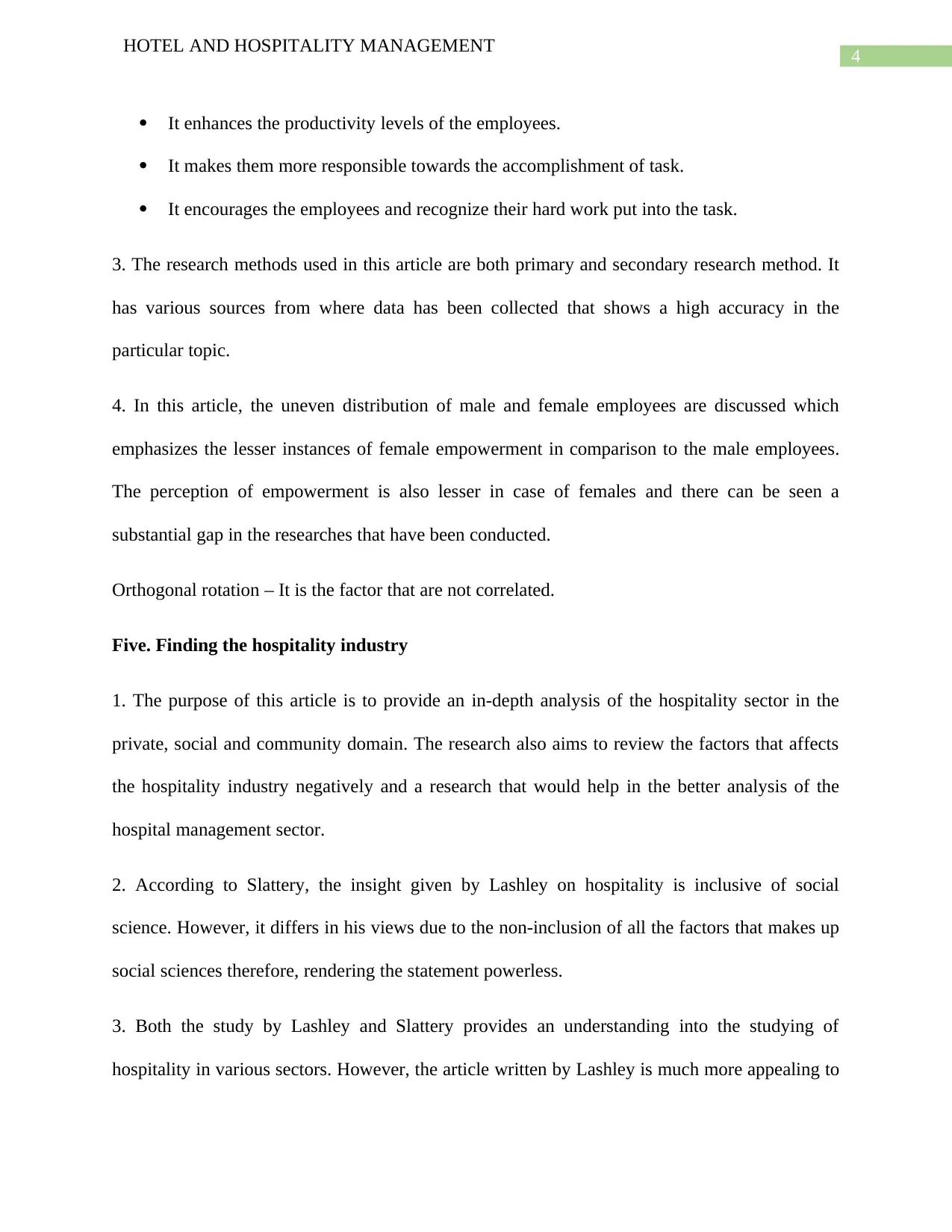
4
HOTEL AND HOSPITALITY MANAGEMENT
It enhances the productivity levels of the employees.
It makes them more responsible towards the accomplishment of task.
It encourages the employees and recognize their hard work put into the task.
3. The research methods used in this article are both primary and secondary research method. It
has various sources from where data has been collected that shows a high accuracy in the
particular topic.
4. In this article, the uneven distribution of male and female employees are discussed which
emphasizes the lesser instances of female empowerment in comparison to the male employees.
The perception of empowerment is also lesser in case of females and there can be seen a
substantial gap in the researches that have been conducted.
Orthogonal rotation – It is the factor that are not correlated.
Five. Finding the hospitality industry
1. The purpose of this article is to provide an in-depth analysis of the hospitality sector in the
private, social and community domain. The research also aims to review the factors that affects
the hospitality industry negatively and a research that would help in the better analysis of the
hospital management sector.
2. According to Slattery, the insight given by Lashley on hospitality is inclusive of social
science. However, it differs in his views due to the non-inclusion of all the factors that makes up
social sciences therefore, rendering the statement powerless.
3. Both the study by Lashley and Slattery provides an understanding into the studying of
hospitality in various sectors. However, the article written by Lashley is much more appealing to
HOTEL AND HOSPITALITY MANAGEMENT
It enhances the productivity levels of the employees.
It makes them more responsible towards the accomplishment of task.
It encourages the employees and recognize their hard work put into the task.
3. The research methods used in this article are both primary and secondary research method. It
has various sources from where data has been collected that shows a high accuracy in the
particular topic.
4. In this article, the uneven distribution of male and female employees are discussed which
emphasizes the lesser instances of female empowerment in comparison to the male employees.
The perception of empowerment is also lesser in case of females and there can be seen a
substantial gap in the researches that have been conducted.
Orthogonal rotation – It is the factor that are not correlated.
Five. Finding the hospitality industry
1. The purpose of this article is to provide an in-depth analysis of the hospitality sector in the
private, social and community domain. The research also aims to review the factors that affects
the hospitality industry negatively and a research that would help in the better analysis of the
hospital management sector.
2. According to Slattery, the insight given by Lashley on hospitality is inclusive of social
science. However, it differs in his views due to the non-inclusion of all the factors that makes up
social sciences therefore, rendering the statement powerless.
3. Both the study by Lashley and Slattery provides an understanding into the studying of
hospitality in various sectors. However, the article written by Lashley is much more appealing to
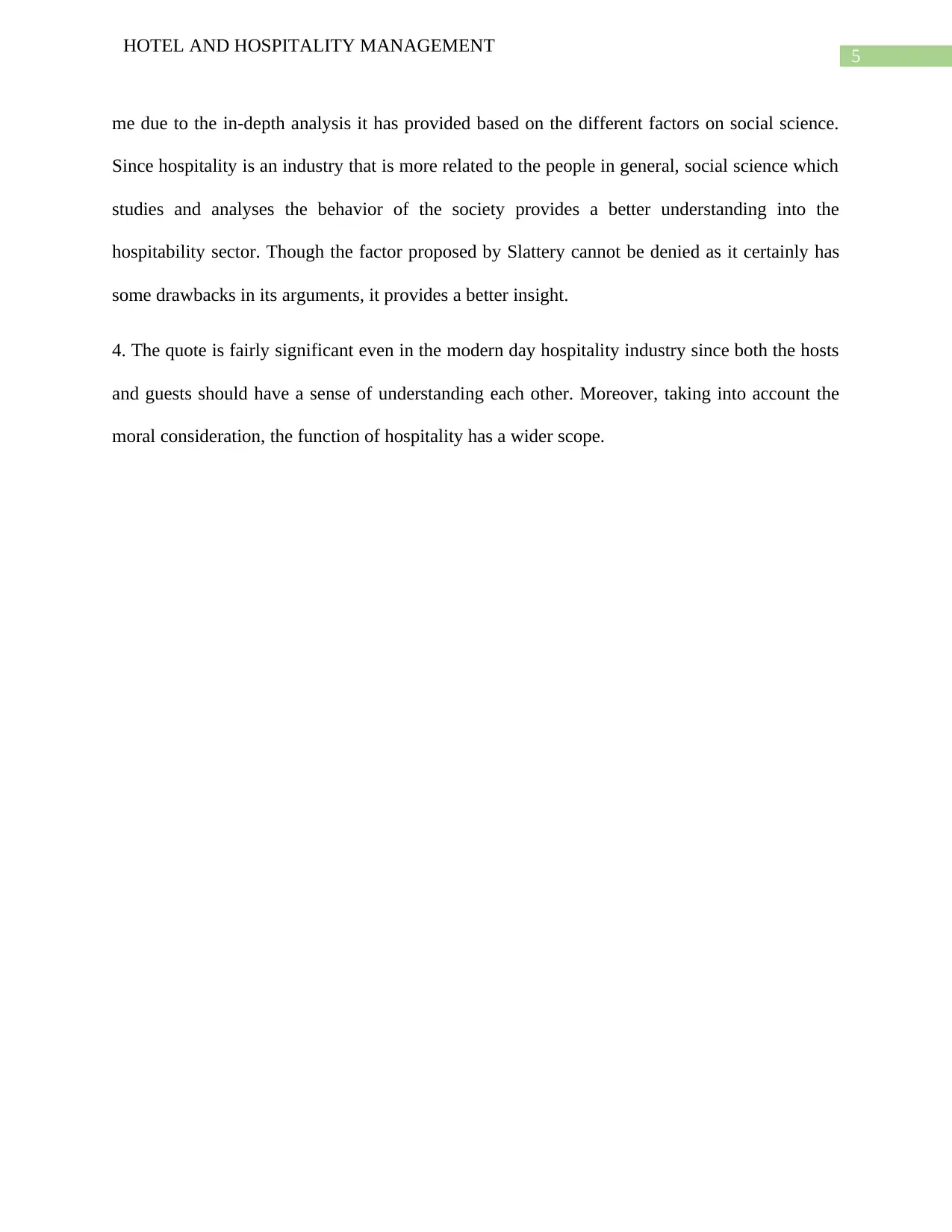
5
HOTEL AND HOSPITALITY MANAGEMENT
me due to the in-depth analysis it has provided based on the different factors on social science.
Since hospitality is an industry that is more related to the people in general, social science which
studies and analyses the behavior of the society provides a better understanding into the
hospitability sector. Though the factor proposed by Slattery cannot be denied as it certainly has
some drawbacks in its arguments, it provides a better insight.
4. The quote is fairly significant even in the modern day hospitality industry since both the hosts
and guests should have a sense of understanding each other. Moreover, taking into account the
moral consideration, the function of hospitality has a wider scope.
HOTEL AND HOSPITALITY MANAGEMENT
me due to the in-depth analysis it has provided based on the different factors on social science.
Since hospitality is an industry that is more related to the people in general, social science which
studies and analyses the behavior of the society provides a better understanding into the
hospitability sector. Though the factor proposed by Slattery cannot be denied as it certainly has
some drawbacks in its arguments, it provides a better insight.
4. The quote is fairly significant even in the modern day hospitality industry since both the hosts
and guests should have a sense of understanding each other. Moreover, taking into account the
moral consideration, the function of hospitality has a wider scope.
⊘ This is a preview!⊘
Do you want full access?
Subscribe today to unlock all pages.

Trusted by 1+ million students worldwide
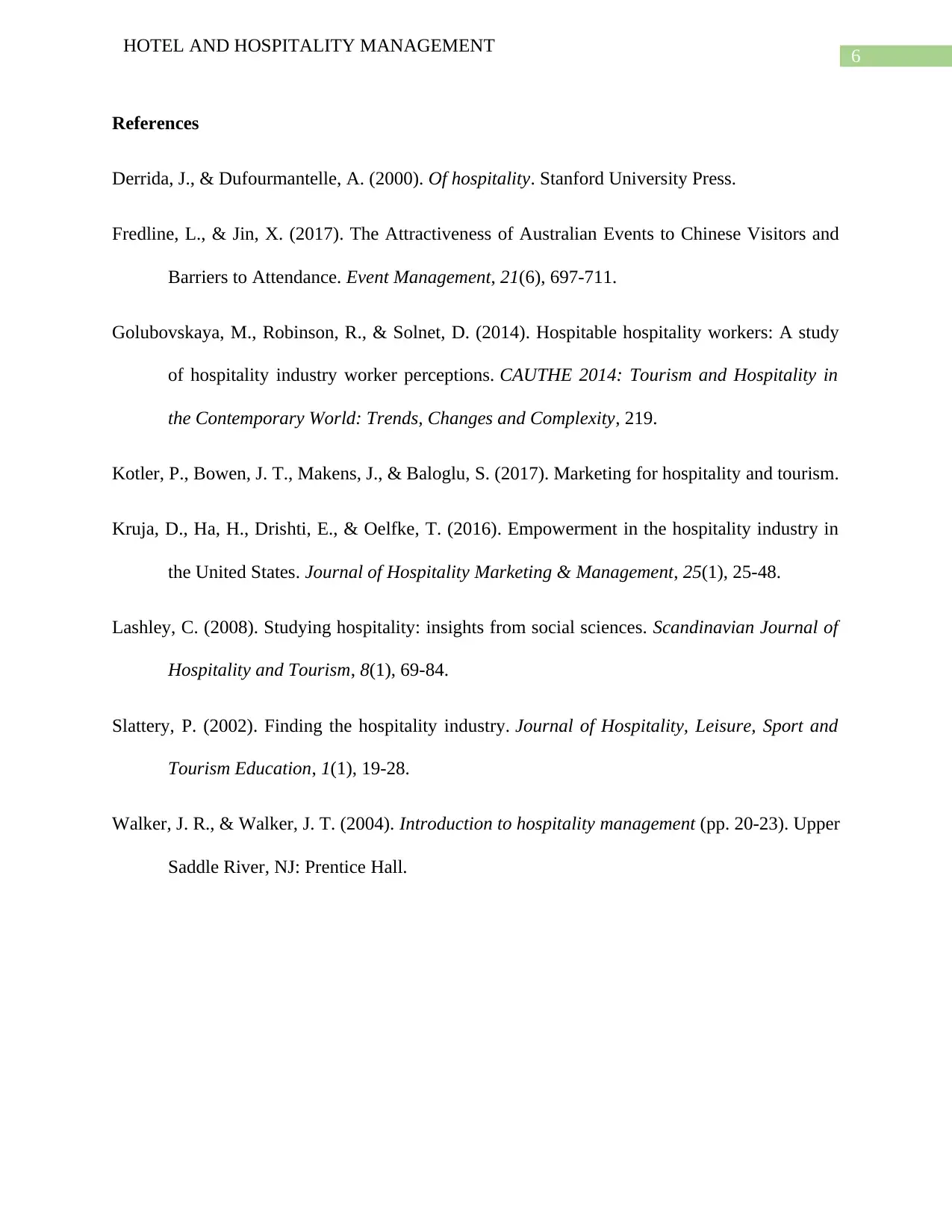
6
HOTEL AND HOSPITALITY MANAGEMENT
References
Derrida, J., & Dufourmantelle, A. (2000). Of hospitality. Stanford University Press.
Fredline, L., & Jin, X. (2017). The Attractiveness of Australian Events to Chinese Visitors and
Barriers to Attendance. Event Management, 21(6), 697-711.
Golubovskaya, M., Robinson, R., & Solnet, D. (2014). Hospitable hospitality workers: A study
of hospitality industry worker perceptions. CAUTHE 2014: Tourism and Hospitality in
the Contemporary World: Trends, Changes and Complexity, 219.
Kotler, P., Bowen, J. T., Makens, J., & Baloglu, S. (2017). Marketing for hospitality and tourism.
Kruja, D., Ha, H., Drishti, E., & Oelfke, T. (2016). Empowerment in the hospitality industry in
the United States. Journal of Hospitality Marketing & Management, 25(1), 25-48.
Lashley, C. (2008). Studying hospitality: insights from social sciences. Scandinavian Journal of
Hospitality and Tourism, 8(1), 69-84.
Slattery, P. (2002). Finding the hospitality industry. Journal of Hospitality, Leisure, Sport and
Tourism Education, 1(1), 19-28.
Walker, J. R., & Walker, J. T. (2004). Introduction to hospitality management (pp. 20-23). Upper
Saddle River, NJ: Prentice Hall.
HOTEL AND HOSPITALITY MANAGEMENT
References
Derrida, J., & Dufourmantelle, A. (2000). Of hospitality. Stanford University Press.
Fredline, L., & Jin, X. (2017). The Attractiveness of Australian Events to Chinese Visitors and
Barriers to Attendance. Event Management, 21(6), 697-711.
Golubovskaya, M., Robinson, R., & Solnet, D. (2014). Hospitable hospitality workers: A study
of hospitality industry worker perceptions. CAUTHE 2014: Tourism and Hospitality in
the Contemporary World: Trends, Changes and Complexity, 219.
Kotler, P., Bowen, J. T., Makens, J., & Baloglu, S. (2017). Marketing for hospitality and tourism.
Kruja, D., Ha, H., Drishti, E., & Oelfke, T. (2016). Empowerment in the hospitality industry in
the United States. Journal of Hospitality Marketing & Management, 25(1), 25-48.
Lashley, C. (2008). Studying hospitality: insights from social sciences. Scandinavian Journal of
Hospitality and Tourism, 8(1), 69-84.
Slattery, P. (2002). Finding the hospitality industry. Journal of Hospitality, Leisure, Sport and
Tourism Education, 1(1), 19-28.
Walker, J. R., & Walker, J. T. (2004). Introduction to hospitality management (pp. 20-23). Upper
Saddle River, NJ: Prentice Hall.
1 out of 7
Your All-in-One AI-Powered Toolkit for Academic Success.
+13062052269
info@desklib.com
Available 24*7 on WhatsApp / Email
![[object Object]](/_next/static/media/star-bottom.7253800d.svg)
Unlock your academic potential
Copyright © 2020–2025 A2Z Services. All Rights Reserved. Developed and managed by ZUCOL.


